 Photo: TeleSUR.
International delegations from more than 20 different countries gathered with Honduran social movements on April 14 to demand justice for Berta Caceres, the environmentalist and indigenous activist assassinated in the Central American nation on March 3.
Photo: TeleSUR.
International delegations from more than 20 different countries gathered with Honduran social movements on April 14 to demand justice for Berta Caceres, the environmentalist and indigenous activist assassinated in the Central American nation on March 3.
-
 Photo: TeleSUR.
International delegations from more than 20 different countries gathered with Honduran social movements on April 14 to demand justice for Berta Caceres, the environmentalist and indigenous activist assassinated in the Central American nation on March 3.
Photo: TeleSUR.
International delegations from more than 20 different countries gathered with Honduran social movements on April 14 to demand justice for Berta Caceres, the environmentalist and indigenous activist assassinated in the Central American nation on March 3.
-
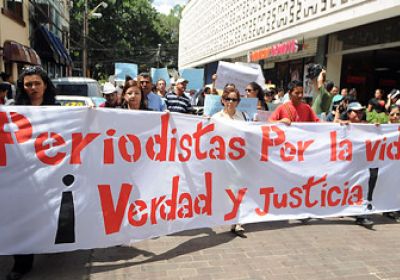 Since the 2009 US-backed coup that removed elected President Manuel Zelaya, 59 journalists have been assassinated in Honduras, with four murdered this year. Last year, 12 journalists were murdered. In April last year, the Honduras National Congress approved the Journalist Protection Law, which included measures like providing police protection when a journalist receives a threat. The law also planned the creation of a centre monitoring threat follow-ups, although the government has not yet approved the budget.
Since the 2009 US-backed coup that removed elected President Manuel Zelaya, 59 journalists have been assassinated in Honduras, with four murdered this year. Last year, 12 journalists were murdered. In April last year, the Honduras National Congress approved the Journalist Protection Law, which included measures like providing police protection when a journalist receives a threat. The law also planned the creation of a centre monitoring threat follow-ups, although the government has not yet approved the budget. -
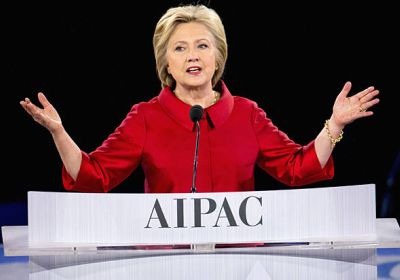 At the recent meeting of the American Israeli Public Affairs Committee (AIPAC), the three remaining Republican presidential candidates and Democratic candidate Hillary Clinton vied to outdo each other as the most supportive of Israel and its right-wing Prime Minister Benjamin Netanyahu. AIPAC is the powerful lobby in the US for the Israeli government and its policies. It exerts great pressure on all members of Congress.
At the recent meeting of the American Israeli Public Affairs Committee (AIPAC), the three remaining Republican presidential candidates and Democratic candidate Hillary Clinton vied to outdo each other as the most supportive of Israel and its right-wing Prime Minister Benjamin Netanyahu. AIPAC is the powerful lobby in the US for the Israeli government and its policies. It exerts great pressure on all members of Congress. -
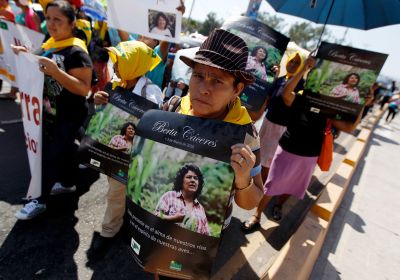
A group of 730 leading Latin American experts and scholars have called for United States Secretary of State John Kerry to halt aid and support to Honduras until the Central American country improves its atrocious human rights record.
-
 Banners unfurled by activists in front of the offices of USAID in Washington to protest the agency's support for a controversial dam project on March 14. Photo: Twitter /@the_intercept
Banners unfurled by activists in front of the offices of USAID in Washington to protest the agency's support for a controversial dam project on March 14. Photo: Twitter /@the_intercept
-
 In a Democratic presidential primary debate in Miami on March 10, against his rival Hillary Clinton, Bernie Sanders opposed US invasions, coups and interventions against Latin American nations. The socialist Senator also strongly opposed the ongoing US embargo against Cuba while praising the island for its social gains in health and education.
In a Democratic presidential primary debate in Miami on March 10, against his rival Hillary Clinton, Bernie Sanders opposed US invasions, coups and interventions against Latin American nations. The socialist Senator also strongly opposed the ongoing US embargo against Cuba while praising the island for its social gains in health and education. -
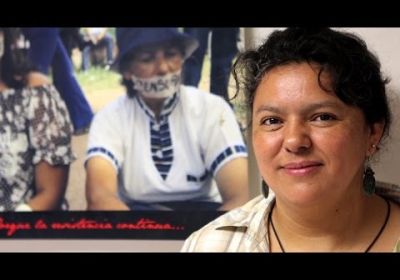
Honduran indigenous and environmental organizer Berta Cáceres has been assassinated in her home in Honduras. She was one of the leading organizers for indigenous land rights in Honduras. In 1993, she co-founded the National Council of Popular and Indigenous Organizations of Honduras, or COPINH.
-
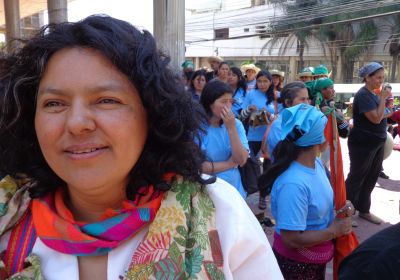 United States Democratic Party presidential hopeful Hillary Clinton has built her campaign around her self-proclaimed dedication to fighting for women’s rights, as well as her superior experience in the realm of foreign policy. Many feminists have disputed her claims, and the women on the receiving end of her foreign policy, particularly in Latin America, are even less likely to see the former Secretary of State as a champion of their rights.
United States Democratic Party presidential hopeful Hillary Clinton has built her campaign around her self-proclaimed dedication to fighting for women’s rights, as well as her superior experience in the realm of foreign policy. Many feminists have disputed her claims, and the women on the receiving end of her foreign policy, particularly in Latin America, are even less likely to see the former Secretary of State as a champion of their rights. -
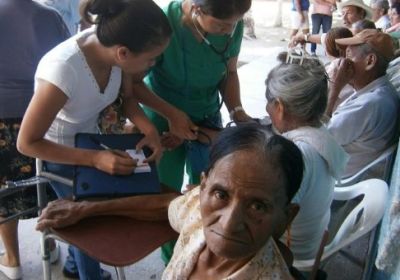
Cuban doctors have served more than 29 million Hondurans and saved at least 250,000 Honduran lives over the past 17 years, local media in the Central American nation said.
-
 Unveiling of monument to Juana Azurduy.
Bolivia's Morales unveils indigenous resistance statue in Argentina
Unveiling of monument to Juana Azurduy.
Bolivia's Morales unveils indigenous resistance statue in Argentina
-
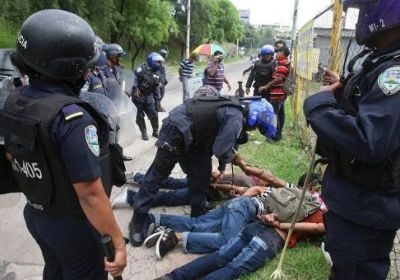
Allegations of human rights abuses have sky-rocketed in Honduras alongside a rise increase in militarisation in the violence-plagued Central American country.
-
 Tens of thousands of Hondurans took to the streets in torch-lit marches on June 26 for the fifth week straight of Friday night protests.
Marchers demanded the resignation of President Juan Orlando Hernandez and an independent investigation into the multi-million dollar corruption scandal embroiling the government.
Tens of thousands of Hondurans took to the streets in torch-lit marches on June 26 for the fifth week straight of Friday night protests.
Marchers demanded the resignation of President Juan Orlando Hernandez and an independent investigation into the multi-million dollar corruption scandal embroiling the government.